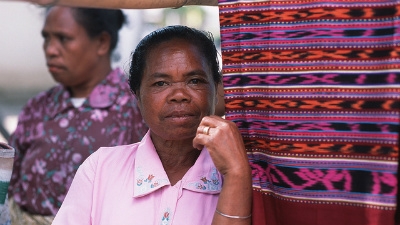Dili, Timor-Leste, September 12, 2014 – Teresinha Goncalves is 85 years old and lives with her daughter and grandchild in a remote village in Bazartete, District of Liquiça, about 50 kilometers from the nation’s capital. She grows and sells vegetables to support herself, her daughter and grandchild.
Every six months Teresinha makes a 4-hour journey from her village to the sub-district administration office to collect her pension.
“The money I receive lightens my burden a little bit, although it is not enough to meet all our needs,” she said.
Alda Santos, 65 years old, comes from the same village as Teresinha. She is also a beneficiary of the elderly pension. She has four children who have left home, but Alda is still helping to raise her grandchildren, who are now in university.
“We were happy to hear that the government was about to start these programs. So we went and registered as soon as we heard about it, so we could receive the fund. But it took a long time, over a year, to finally receive the money,” Alda explained.
Multiple databases a major challenge in cash transfer administration
After going through long years of conflicts, Timor-Leste is gradually emerging from the ashes of destruction to progress as a fully-fledged nation-state. Building a social safety net to protect the most vulnerable people has been a focus of the government over the last few years, and has rapidly become one of the largest budgetary expenditure items. The government, through the Ministry of Social Solidarity (MSS), introduced a set of cash transfer programs, including Bolsa da Mãe for mothers whose children are enrolled in schools in rural areas, the elderly, and disabled people.
However, the country faces major challenges in administering and implementing these social cash transfers programs. One of the biggest challenges is how to deliver cash transfers effectively due to poor data on the beneficiaries. There are cases where some of the recipients have created double identities therefore receiving cash transfers twice, while others who eligible are still waiting.

